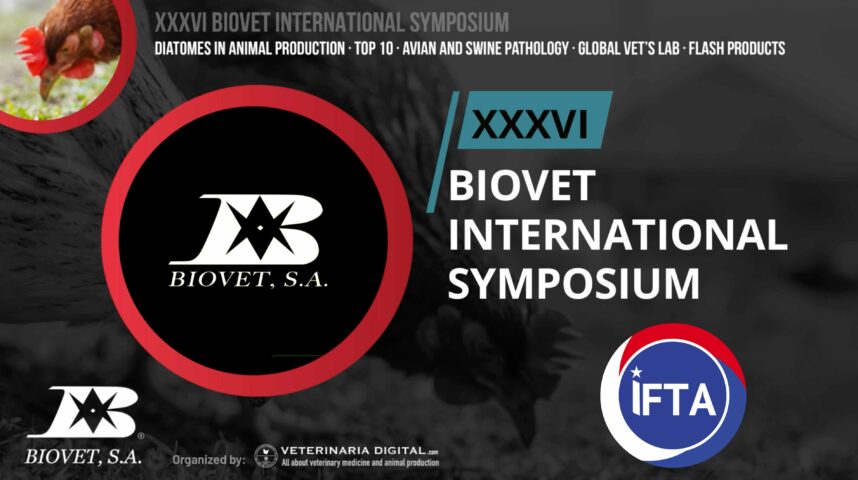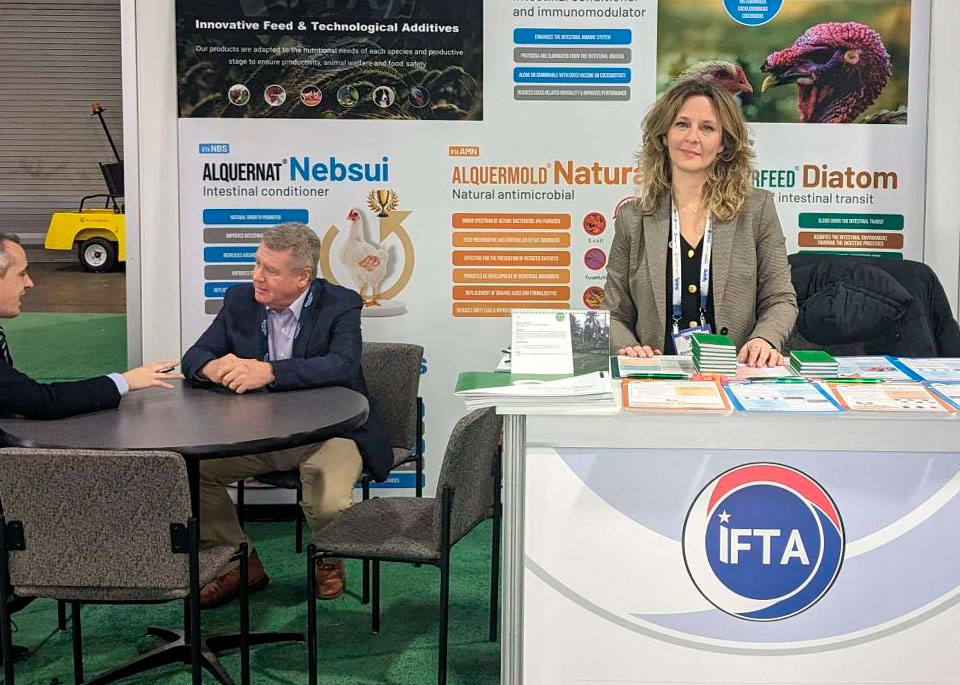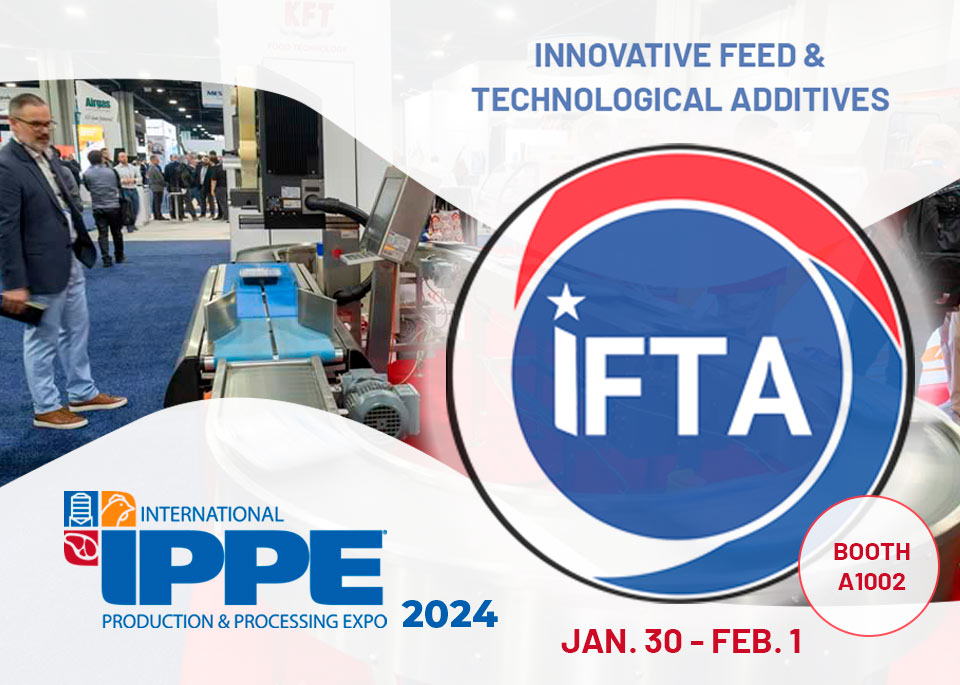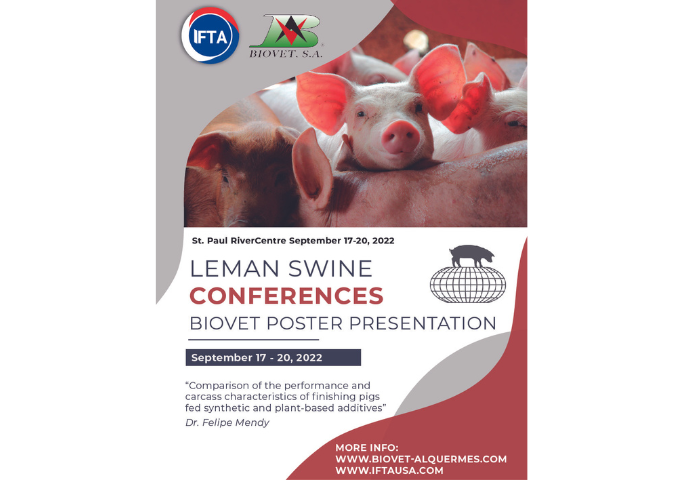
On October 20, the Biovet & Ifta International Symposium was held in virtual format. The event included the presentation of the new product Alquerfeed Diatom, as well as the services of Global Vet’s Lab and TOP 38 catalogue.
In the first session of the congress Dr. Julia Pié, from Biovet S.A., explained the impact of rapid transit in poultry production. Feed do not remain enough time in the intestine thus the absorption of nutrients is not completed.
Therefore, the rapid transit of poultry affects the productive parameters and intestinal welfare in poultry farming. In addition, poultry farm expenses increase due to diarrhea treatments, wet litter management, increased mortality, and the appearance of infectious or ammonia diseases.
Alquerfeed Diatom reduces the intestinal transit of poultry
Then, Dr. Anna Tesouro of Biovet S.A. presented Alquerfeed Diatom, a new product intended to reduce the intestinal transit in birds, developed by Biovet’s R&D team.
It is a product based on optimized diatoms which increases the retention time of feed in the digestive tract of poultry, which favors feed contact with digestive enzymes and intestinal microvilli. This has a positive effect on the growth rate, feed efficiency, and intestinal welfare.
Field trials support Alquerfeed Diatom
Dr. Connie Gallardo of the Universidad Científica del Sur in her lecture explained the field trials of Alquerfeed Diatom in broilers carried out in the university located in Lima, Peru. For the trial, 440 broilers were used for 42 days treated with Alquerfeed Diatom compared to birds whose diet contained no additives.
Among the results on intestinal transit, it was found that the poultry treated with Alquerfeed Diatom had a slowdown of intestinal transit by an average of 16 minutes. In addition, this product improves nutrient digestibility (protein, crude fiber, ash, calcium, phosphorus) and energy utilization.
On the other hand, in the results related to productive parameters, it was found that the treated batch gained more weight from day 7 of age until the end of the trial (3% more than the birds in the control batch). In addition, they presented lower mortality; and weight gain was slightly higher.
In the results related to feed consumption, there were no significant differences, which shows that the poultry consumed the same feed and made better use of the nutrients. Additionally, the feed conversion rate improved by 3.78% in the poultry supplemented with Alquerfeed Diatom compared to the control batch. Finally, the carcass yield had a notable improvement in the treated poultry.
These results of poultry treated with Alquerfeed Diatom showed better economic performance, with higher meat production and less investment in feed, thanks to efficient intestinal absorption.
Global Vet’s Lab: quality technical support to farms
To finish this session, Dr. Julia Pié, from Biovet technical team presented the services of Global Vet’s Lab related to on-site and remote technical support to offer solutions for animal industry problems, according to each region. Global Vet’s Labs catalog of services includes the following:
- Optifeed: specialized technical equipment that evaluates the diets used on farms and supports the formulation of new diets. It also calculates the economic return to find the best profitability for the farm.
- Fungi-Lab: microbiological analysis service to analyze fungal contamination at a qualitative and quantitative level, as well as to calculate preservative and biocide dosage.
- Mycotox-Lab: service to evaluate the mycotoxin load in feed and understand the impact on animals and create an effective program to prevent them with the use of Silicoglycidol.
- Diagnovet: service by images that includes clinical and field advice to reach a presumptive or definitive diagnosis of pathology on the farm.
- Sci-Lab: consists of a bibliographic collection of scientific articles aimed at solving field problems on farms.
- Microbiological isolation: the service is performed from biological samples to isolate and identify microorganisms and their pathogenicity. Therefore, the causal agent of disease in the farm is diagnosed. The service is available for poultry, swine, ruminants, and aquaculture.
The event finished with the presentation of the company’s TOP 38 catalog. It is a catalog that collects the most used products during the 38 years of the company. In this session, several clients showed how some of these solutions are working on their farms. For more information about the presentations contact us at marketing@iftausa.com



